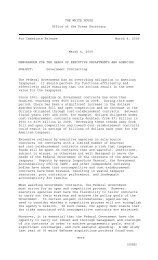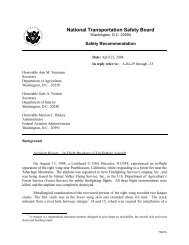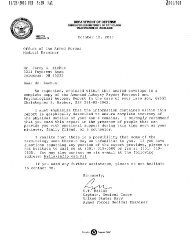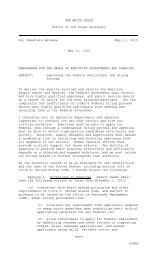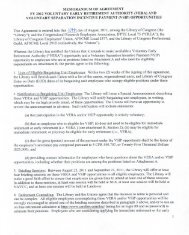Financial Management: Providing a Foundation for Transition - AGA
Financial Management: Providing a Foundation for Transition - AGA
Financial Management: Providing a Foundation for Transition - AGA
- No tags were found...
Create successful ePaper yourself
Turn your PDF publications into a flip-book with our unique Google optimized e-Paper software.
1Executive summaryIn 2008, 239 federal financial management executivesand managers took part in the 12th annual chief financialofficer (CFO) survey sponsored by the Association ofGovernment Accountants (<strong>AGA</strong>) and conducted by GrantThornton LLP. Survey respondents are proud of thefinancial management and internal control successes ofthe past 7 years. However, they say that the governmentmust head in a new direction to achieve even greatergains. Future improvements need to focus on how theCFO can add value to missions and programs, not justcomply with regulations.<strong>Financial</strong> reportingMost survey respondents agree that the way the Federal Governmentprepares, presents and audits annual financial statements is broken. Only5 percent of citizens are satisfied with the federal financial in<strong>for</strong>mation theyreceive, according to another 2008 <strong>AGA</strong> survey. Designed <strong>for</strong> industry, thecurrent financial reporting model costs too much and delivers little usefulin<strong>for</strong>mation to government decision makers. Needed are new modelsthat are more transparent to citizens, relevant to decision makers andappropriate <strong>for</strong> government. The Executive Branch can make some of thechanges required <strong>for</strong> such models. Also, federal entities can reduce the costand improve the quality of the current model or other models by using arisk management approach.Accounting and auditing standardsMost executive respondents think the approach used by federal auditors <strong>for</strong>financial reports adds value to government management. Nonetheless, halfcalled <strong>for</strong> changing federal accounting standards and 60 percent <strong>for</strong> newaudit standards. They want the standards to be more relevant to the business,goals and purpose of government. In essence, the standards shouldguide reporting on per<strong>for</strong>mance in areas that matter to program managersand citizens, not just to auditors.Internal controlThree out of four executives in the survey are positive about the WhiteHouse Office of <strong>Management</strong> and Budget’s (OMB) December 2004revision of Circular A-123, <strong>Management</strong>’s Responsibility <strong>for</strong> InternalControl. They think that the circular has helped improve controls overfinancial reporting. However, the respondents say that more mustbe done to improve and monitor controls on program efficiency andeffectiveness—mission success is more importantthan getting the financial numbers right.Consolidation and integrationConsolidating and integrating the many financeandcontrols-related mandates placed on federalentities by Congress and OMB could reducethe work of complying with them. On theirown, entities can combine compliance activitiesto save time and money. This will also help tointegrate controls on processes that cut acrossorganizational boundaries. One way to achievesuch integration is <strong>for</strong> CFOs to become theirentities’ chief accountability officers, responsible<strong>for</strong> risk management, tracking return on investmentand providing support to programs.Future CFOsIn the future, the quintessential federal CFOwill have a relationship of mutual trust withdepartmental and agency leaders and be skilledin developing and retaining an effective financialteam. Such CFOs will understand the federalbudget process, have accounting acumen, knowthe business in<strong>for</strong>mation needs of programmanagers and be skilled in selling a budget toOMB and Congress, internal control to programmanagers and the benefits of integrated financialand per<strong>for</strong>mance in<strong>for</strong>mation to everyone.All signs point toward a bleak fiscal future <strong>for</strong>the Federal Government. Massive deficits and thecosts of overseas conflicts mean fewer resources <strong>for</strong>programs and some tough budget decisions. If CFOsstay on the present path of financial management,they will be of little use in making those decisions.With the course corrections suggested by currentCFOs in this report, future CFOs can providethe integrated financial and per<strong>for</strong>mance analysisdecision makers need. They will also be better ableto help program managers to develop more costeffectiveoperations. In short, future CFOs will addmore value than ever be<strong>for</strong>e, if they follow the rightpath to success.




